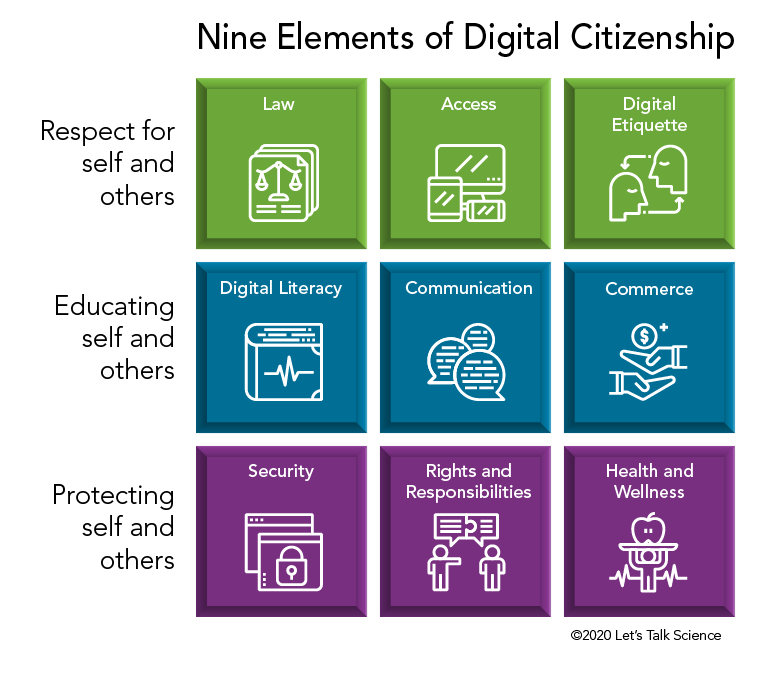
Digital citizenship
Digital citizenship is about thinking critically, behaving safely, and participating responsibly and ethically in the digital world.
Let’s talk science

Some of the key messages when educating students about digital citizenship and using social media covered in this video are: treat others as you’d like to be treated; be respectful; real-life consequences of negativity; don’t take material that doesn’t belong to you; digital footprint; be careful with your personal information; don’t spread misinformation; don’t believe everything you read online; factcheck; and my favourite, “don’t feed the trolls”!
Mike Ribble and Marty Park (2019) have created the following model to define nine elements of digital citizenship that they suggest should be included in any digital citizenship program.

There are many great resources online to teach some of the digital citizenship concepts to students. Like this digital etiquette video from Brain POP. Developing responsible digital citizens is a key aspect of education for the 21st century.
This is a good teacher resource of podcasts on the topic of digital citizenship with many links to other useful sites.
Legalities of technology across the curriculum
Legal Issues for EdTech Companies
According to Johnson (2016), there were five top legal issues edtech companies or start-ups needed to considered:
- Data privacy – addressing issues related to your company’s intentional use of data; just having a privacy policy is not enough, it needs to be relevant, compliant with acts like FOIPPA/FIPPA, and current.
- Data security – what your company does to prevent unintentional access to personal data; having a comprehensive data security plan; having a breach response plan; the cost of remediating a data breach in this sector can be expensive.
- Accessibility for users with disabilities – is your technology accessible to students with physical and/or mental disabilities (ADA compliance in the USA; web content accessibility guidelines 2.0 – WCAG compliant); do you solicit and respond to user feedback?
- Intellectual property – have you spoken to an IP attorney and decided what to patent?
- Fundamental issues – do you have the right corporate structure; do you have a founders agreement; does your company own its relevant IP; do you have a template client agreement?
There are other legal issues to consider, like the school administration procurement process, but these were deemed by the author to be the top five for education technology start ups and small companies to consider.
Students must be taught about copyright law and the importance of not stealing other peoples’ work and claiming it as their own. This is an important principle that needs to be understood – copyright matters.
In British Columbia, educators and administrators must act in accordance with the Freedom of Information and Protection of Privacy Act (FOIPPA). School Districts must set compliance guidelines for FOIPPA. A free training course is available to teach public sector workers the foundations of FOIPPA: https://mytrainingbc.ca/FOIPPA/.
Course notes on some of the high level legalities educators and administrators must consider:
- copyright & ownership (students own their work, implications for digital tool license and end user agreements)
- identifiability, content & risks (personal sensitive and identifying data must not be online – can be compiled from a variety of sources – use anonymous emails not real names)
- storage location & risks (log in for portals sharing data, sandboxed environments, secure data storage, demonstrate due diligence followed to BC Privacy Commissioner in case of data breach, any data stored on US servers can be access by US government & intelligence services)
- explicit informed consent & risks (consents provided for collection, storage, use of data, educational activities, alternatives must be offered, guardians have the right to deny consent, check user agreements for online services).
Online safety
Two key resources that provide training and support for understanding and teaching online safety are Safer Schools Together and MediaSmarts.
MediaSmarts is a Canadian site that provides a number of resources for educators and parents on the topic of digital media literacy. In particular, I like the distinction between media issues and digital issues. This would be a good starting point for educators to consider lesson planning on online or digital safety as there are many topics to cover.
- body image
- gender representation
- diversity in media
- intellectual property
- marketing & consumerism
- violence.
- authenticating information
- cyberbullying
- cyber security
- excessive internet use
- online gambling
- online hate
- online ethics
- online marketing
- privacy
- pornography
- sexual exploitation
- sexting.
BC Digital Literacy Framework – digital citizenship
- Internet safety (understand that some websites/apps can be harmful)
- Privacy and security (understand passwords and to protect private information)
- Relationships and communication (responsible for how you communicate to people)
- Cyberbullying (recognize it and know how to deal with it, talk to a trusted adult)
- Digital footprint and reputation (awareness of digital footprint and tail; risks of sharing inappropriate information; your content can be copied/shared)
- Self-image and identity (perceptions of others might not be realistic; people may not be whom they appear to be online)
- Creative credit and copyright (creative ownership, plagiarism, copyright/licence rules, collective commons, copyleft; use of collective intelligence – i.e. Crowd sourcing)
- Legal and ethical aspects (appropriate and socially responsible behaviour; knowledge of legal and ethical aspects of use of ICT)
- Balanced attitude towards technology (open-minded, informed, yet aware of risks and able to self-manage online)
- Understanding and awareness of the role of ICT in society (understand broader context of use and development of information and communication technology).
BC school legislature – schools have the right to investigate anything that happens inside or outside school that affects the school environment.
Schools cannot control online cyberspace, but can educate students and investigate incidents that affect the school environment and its students.
References
FOIPPA. (2023, May 31). Freedom of information and protection of privacy act. BCLaws. https://www.bclaws.gov.bc.ca/civix/document/id/complete/statreg/96165_00
Johnson, M. (2016 April 16). The top five legal issues for edtech startups and schools. EdSurge. https://www.edsurge.com/news/2016-04-16-the-top-five-legal-issues-for-edtech-startups-and-schools
Let’s Talk Science. (2020, October 5). Digital citizenship & ethics. Let’s Talk Science. https://letstalkscience.ca/educational-resources/backgrounders/digital-citizenship-ethics
Ribble, M. & Park, M. (2019, November 30). Making digital citizenship “stick”. TechLearning. https://www.techlearning.com/resources/digital-citizenship-framework-updated